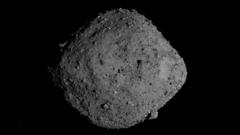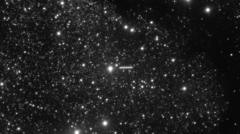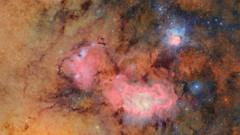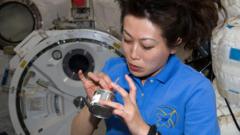Recent research on the samples collected from asteroid Bennu has unveiled an array of organic compounds that could help unravel the mysteries of life's beginnings.
Asteroid Bennu Unveils Organic Compounds That May Hold Secrets to Life's Origins

Asteroid Bennu Unveils Organic Compounds That May Hold Secrets to Life's Origins
New findings from asteroid samples suggest the building blocks for life may have arrived on Earth via space rocks.
Astrophysicists have discovered that the samples retrieved from asteroid Bennu contain critical organic compounds, providing new insights into the origins of life on Earth. The analysis, published in the journal Nature, shows that the black dust collected by NASA's OSIRIS-REx spacecraft harbors various amino acids, nucleobases, and essential minerals, indicating that this 500-meter-wide celestial body is a treasure trove of cosmic chemistry.
The OSIRIS-REx mission, which aimed to gather asteroid material, succeeded in collecting about 120 grams of dust from Bennu, a job deemed one of NASA's most ambitious endeavors. According to scientists, the samples contain prominent building blocks of life, including 14 out of the 20 known amino acids and all four nucleobases essential for DNA formation—adenine, guanine, cytosine, and thymine.
Prof Sara Russell from the Natural History Museum in London remarked on the significance of the findings, stating, "It's telling us about our own origins, and it enables us to answer these really, really big questions about where life began." These discoveries lend credence to the hypothesis that asteroids may have played a pivotal role in delivering life's essentials, such as water and organic materials, to Earth's surface billions of years ago.
Supporting this line of inquiry, Dr. Ashley King from the Natural History Museum explained that the early Solar System was chaotic, populated by countless asteroids that likely bombarded the young Earth. "Earth is unique, in that it's the only place where we have found life so far, but we know asteroids were delivering those ingredients throughout the Solar System," King said.
The research also points to the presence of ammonia, vital for biochemical reactions, further suggesting that water may have once existed on Bennu. While some compounds identified had been recorded in meteorite samples before, others found in Bennu's dust were previously unknown, underscoring the exceptional richness of the asteroid's composition.
As scientists continue to explore these findings, they hope to answer critical questions surrounding the conditions necessary for life. Their efforts will extend to studying other samples retrieved from Bennu and further examining our cosmic neighborhood, potentially shed light on the universality of life in the universe.
In conclusion, the data derived from Bennu not only enhances our understanding of life's building blocks but also hints at the possibility of similar compounds existing on other celestial bodies within our Solar System. The ongoing study of this cosmic treasure promises to revolutionize the way we perceive our planetary origins and the fundamental processes that led to life.
The OSIRIS-REx mission, which aimed to gather asteroid material, succeeded in collecting about 120 grams of dust from Bennu, a job deemed one of NASA's most ambitious endeavors. According to scientists, the samples contain prominent building blocks of life, including 14 out of the 20 known amino acids and all four nucleobases essential for DNA formation—adenine, guanine, cytosine, and thymine.
Prof Sara Russell from the Natural History Museum in London remarked on the significance of the findings, stating, "It's telling us about our own origins, and it enables us to answer these really, really big questions about where life began." These discoveries lend credence to the hypothesis that asteroids may have played a pivotal role in delivering life's essentials, such as water and organic materials, to Earth's surface billions of years ago.
Supporting this line of inquiry, Dr. Ashley King from the Natural History Museum explained that the early Solar System was chaotic, populated by countless asteroids that likely bombarded the young Earth. "Earth is unique, in that it's the only place where we have found life so far, but we know asteroids were delivering those ingredients throughout the Solar System," King said.
The research also points to the presence of ammonia, vital for biochemical reactions, further suggesting that water may have once existed on Bennu. While some compounds identified had been recorded in meteorite samples before, others found in Bennu's dust were previously unknown, underscoring the exceptional richness of the asteroid's composition.
As scientists continue to explore these findings, they hope to answer critical questions surrounding the conditions necessary for life. Their efforts will extend to studying other samples retrieved from Bennu and further examining our cosmic neighborhood, potentially shed light on the universality of life in the universe.
In conclusion, the data derived from Bennu not only enhances our understanding of life's building blocks but also hints at the possibility of similar compounds existing on other celestial bodies within our Solar System. The ongoing study of this cosmic treasure promises to revolutionize the way we perceive our planetary origins and the fundamental processes that led to life.


















